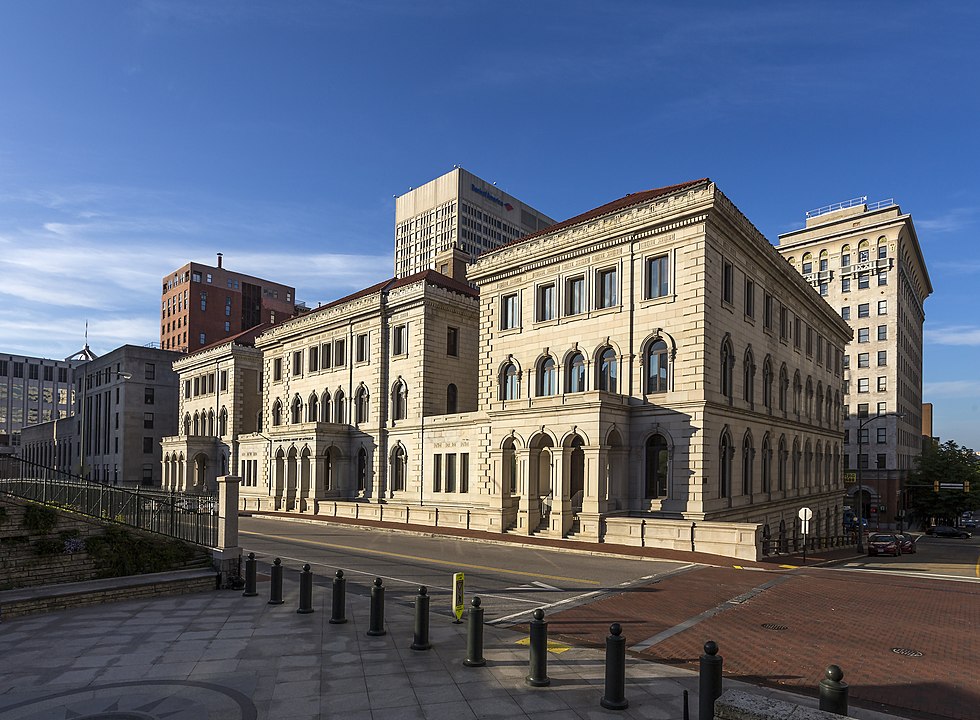RICHMOND, Va. (CN) — The Fourth Circuit heard an argument Tuesday contending a terrorism sentencing enhancement fails to account for individual circumstances.
In the latest attempt to lessen his sentence, Hysen Sherifi argued the terrorism enhancement distorts the sentencing guidelines range, rendering a defendant's circumstances irrelevant. Sherifi and seven other members of a North Carolina-based terrorist cell were charged in 2009 with conspiring to attack the Marine base in Quantico, Virginia, and to support violent jihad in foreign countries materially.
Sherifi argues his failed conspiracy shouldn't hold the same sentencing weight as those who followed through with acts of terrorism. A judge sentenced Sherifi to 45 years in prison in 2011.
The Fourth Circuit affirmed the lower court's sentencing in 2014, finding he had no been prosecuted for an "Orwellian 'thoughtcrime'" because he intended to act on his convictions. In addition to conspiracy, the jury found Sherifi guilty of of stockpiling weapons received through interstate commerce, firearms possession in pursuit of crimes of violence, knowing the sale of a gun to a convicted felon, and making false statements.
In 2019, the Supreme Court in United States v. Davis found firearms convictions related to violent crimes to be unconstitutionally vague. The lower court vacated Sherifi's sentence entirely and scheduled a full resentencing on his remaining counts; the judge again found a life sentence too long, but took off only two years from his more than four-decade sentence, citing the dangerousness of the offense.
Chief U.S. Circuit Judge Albert Diaz, a Barack Obama appointee, said he believed the lower court judge did factor in Sherifi's circumstances by choosing not to impose a life sentence.
Cullen Macbeth, a federal public defender representing Sherifi, argued the lower court didn't do enough to address what he views as a non-frivolous argument that the terrorism enhancement skewed his sentencing. The court applied a terrorism enhancement for committing a felony that involved or was intended to promote terrorism, which automatically places a defendant in the highest criminal history category.
Macbeth didn't quibble with the enhancement applying to his client, but argued that the policy itself is not sound.
"The guideline fails to differentiate between the very wide spectrum of people who commit terrorism enhancements because it's a very blunt instrument," Macbeth said.
Sherifi received two other sentence enhancements, for targeting victims based on national origin and religion and for intending a victim to be a government officer or employee, and being motivated by that person's status, bringing the total enhancement to the maximum offense level.
Sentencing for conspiracy to kill, kidnap, maim or injure persons or damage property in a foreign country depends on the intent determined by the jury. Conspiracy to maim carries a 35-year maximum sentence, while conspiracy to murder or kidnap allows for life imprisonment. Without consulting the jury on what Sherifi conspired to do, the lower court judge applied the conspiracy to murder enhancement. The government contends the error is harmless because the jury would have come to the same conclusion due to overwhelming evidence.
While Sherifi argues that the combination of the lower court judge's failure to explain his decision and the jury's error seriously affected the fairness, integrity and public reputation of judicial proceedings, the government claims the mistake didn't burden Sherifi's rights because there was already overwhelming evidence that the object of the conspiracy was murder.
U.S. Circuit Judge Harvie Wilkinson, a Ronald Reagan appointee who also presided over the case's first visit to the Fourth Circuit, seemed to agree with the government.
"It seems to me this whole proceeding and the way it was conducted is a credit to the judicial system, not something that brought it into disrepute," Wilkinson said. "What the individual did, according to the jury and according to the sentencing judge, was simply to try to go and on the basis of religion or jihad or whatever it is to murder large numbers of his fellow human beings."
Sherifi and his co-conspirators followed the lead of Daniel Boyd, an Islam convert who earned the nickname Saifullah, or sword of God, for his participation in the Afghan resistance against the Soviet occupation. With Boyd's help, the co-conspirators traveled to Gaza, Israel, Jordan and Kosovo in the hopes of making their way to Palestine to engage in jihad.
After a stint in Kosovo, Sherifi and Boyd formulated a plan. They began training to attack Quiatico, an ideal target as Boyd was already familiar with it, having lived there as a child. The FBI intervened and arrested Sherifi when he was 24 years old.
Regardless of the Fourth Circuit's decision, Sherifi is already serving a life sentence for a 2013 murder-for-hire plot in which he conspired to kill via beheading three FBI agents and three government informants who had testified at his trial.
U.S. Circuit Judge Robert King, a Bill Clinton appointee, completed the three-judge panel. Attorneys representing Sherifi and the government did not respond to requests for comment.
Subscribe to Closing Arguments
Sign up for new weekly newsletter Closing Arguments to get the latest about ongoing trials, major litigation and hot cases and rulings in courthouses around the U.S. and the world.









